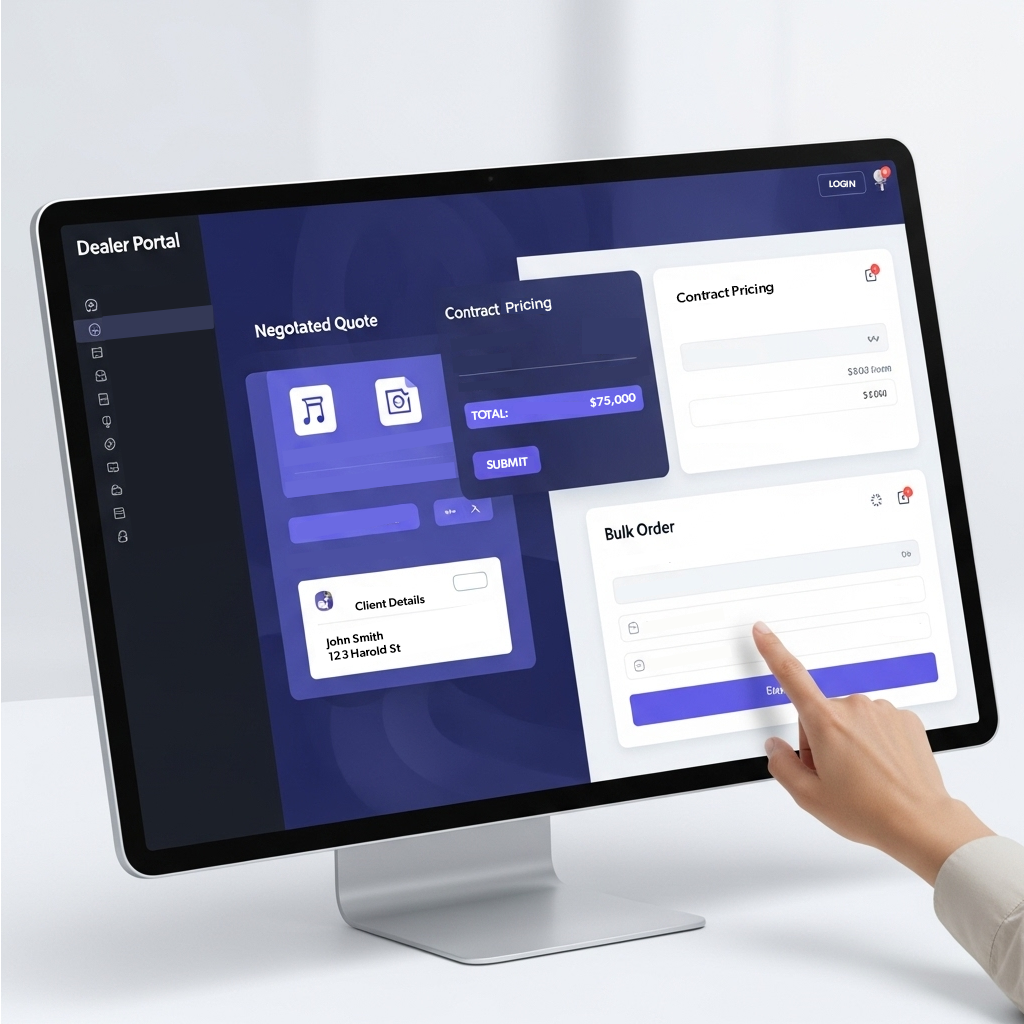How Broadleaf Commerce Transforms Dealer Portals
Written by
Broadleaf
Published on
Jul 31, 2025
Most B2B companies know the pain: you've got dozens or hundreds of dealers, each with different needs, contracts, and ways of doing business. Your current eCommerce platform wasn't built for this complexity. Dealers are frustrated with generic experiences that don't reflect their specific pricing or product access. Your sales team spends too much time on manual processes that should be automated.
This is where a proper dealer portal makes all the difference. Not just another B2B website, but a platform that actually understands how dealer relationships work. Broadleaf Commerce has been helping companies solve exactly these problems, and the results speak for themselves.
Here's what we see all the time: a company launches with a standard B2B eCommerce site. It works fine for direct customers, but dealers quickly hit walls. They can't see their contract pricing. The product catalog shows items they're not authorized to sell. Order approval workflows don't match how their business actually operates.
The numbers tell the story. Research shows that 86% of B2B buyers abandon their purchase journey due to friction in the buying process. When you're dealing with dealers who have their own customers waiting, that friction becomes even more costly.
Traditional eCommerce platforms treat every customer the same way. But dealer relationships are inherently different. You might have regional distributors with exclusive territories, international resellers with currency requirements, or specialty dealers who only sell certain product lines. A one-size-fits-all approach simply doesn't work.
What Makes Broadleaf Different
Broadleaf Commerce was built from the ground up to handle complex B2B scenarios. Instead of forcing you to adapt your business to the platform's limitations, Broadleaf adapts to how you actually work.
The technical foundation matters here. Broadleaf uses a microservices architecture, which means different parts of the system can be customized independently. Need custom pricing logic? You can build that without touching the inventory management system. Want to integrate with a specific ERP? The API-first design makes that straightforward.
But the real advantage isn't just technical flexibility. It's what that flexibility enables for your dealers and your business:
Custom Everything: Every layer of the platform can be tailored. Your APIs, data models, and user interfaces - all of it can be modified to match your exact business processes. This isn't just configuration; it's true customization.
Real Integration: Broadleaf connects with your existing systems without the usual headaches. Your ERP, CRM, inventory management, accounting software - they all work together instead of creating data silos that require manual reconciliation.
One Place to Manage Everything: Instead of juggling multiple admin panels and systems, Broadleaf gives you a single console to manage your entire dealer network. Different team members get access to what they need - merchandising, customer service, and platform management - based on their roles.
Growth Without Growing Pains: Adding new dealers, expanding to new regions, handling seasonal spikes - the platform scales with your business. Each component can scale independently, so you're not held back by bottlenecks in parts of the system you're not even using heavily.
Real-World Applications: How Companies Use Broadleaf
The best way to understand what Broadleaf can do is to look at how companies actually use it. These aren't theoretical use cases - they're patterns we see implemented successfully across different industries.
Making Each Dealer Feel Special
One of our manufacturing clients had a problem: they served both large regional distributors and small specialty shops, but their old system treated them all the same. The small shops were overwhelmed by products they couldn't sell, while the big distributors couldn't find the specialized items they needed.
With Broadleaf, each dealer now sees a customized catalog. The platform manages thousands of different price points based on volume commitments, regional agreements, and product categories. A dealer in California sees different products and pricing than one in Texas, but both feel like the platform was built just for them.
The system handles complex account hierarchies, too. A large distributor might have multiple locations, each with different managers who need access to place orders, but only the main office can approve large purchases. Broadleaf manages these relationships without requiring dealers to call in for every transaction.
Streamlining the Ordering Process
B2B ordering is rarely as simple as "add to cart and checkout." Dealers often need quotes, especially for large or custom orders. They need to check with their own customers before finalizing purchases. They need orders approved by their managers or your sales team.
Broadleaf handles all of this. Dealers can configure complex orders themselves, getting real-time pricing and availability. When they need a quote, the system can route it to the right sales rep automatically. The rep can adjust pricing, modify the order, and send it back for approval - all within the platform.
For routine reorders, dealers love features like quick reorder lists and bulk upload capabilities. One distributor told us they cut their ordering time by 70% just by being able to upload a CSV file instead of adding items one by one.
Inventory Visibility That Actually Works
Nothing frustrates dealers more than finding out an item is out of stock after they've already promised it to their customer. Broadleaf provides real-time inventory visibility across all your locations.
The system goes beyond just "in stock" or "out of stock." Dealers can see exactly how many units are available, when new stock is expected, and even place pre-orders for upcoming inventory. For industries where timing is critical, this visibility can make or break dealer relationships.
We've seen companies reduce overselling incidents by over 90% just by giving dealers accurate, real-time inventory information.
Supporting Complex Dealer Structures
Not all dealers operate the same way. Some are single locations with straightforward needs. Others are multi-location operations with complex hierarchies, shared warehouses, and different ordering authorities at different levels.
Broadleaf accommodates all of these structures. You can run multiple dealer storefronts from one back-end system, each with its own branding, product selection, and pricing rules. Dealers can manage their own sub-accounts and user permissions, reducing the administrative burden on your team.
The self-service capabilities are particularly powerful. Dealers can set up their own users, manage addresses, view order history, and access reports without calling your customer service team. This reduces your workload while giving dealers the autonomy they want.
What This Means for Your Business
Companies that implement Broadleaf dealer portals typically see improvements in several key areas:
Operations get more efficient. Manual processes get automated. Order processing speeds up. Your team spends less time on routine tasks and more time on strategic work. One client reduced their order processing time from 2 days to 2 hours.
Dealer relationships get stronger. When dealers have the tools and information they need, they're more successful. More successful dealers place more orders and stick around longer. We've seen dealer retention rates improve by 25% or more after portal implementations.
Growth becomes easier. Adding new dealers used to mean weeks of setup and training. With a self-service portal, new dealers can be up and running in days. Expanding to new regions or product lines becomes a configuration change instead of a major project.
You stay ahead of the competition. The flexibility of Broadleaf's architecture means you can add new features and capabilities quickly. When market conditions change or new opportunities arise, you can respond faster than competitors stuck with rigid systems.
The Technical Foundation That Makes It Possible
What makes all of this possible is Broadleaf's underlying architecture. The platform is built on modern microservices principles, which means different components can be developed, deployed, and scaled independently.
This isn't just technical jargon - it has real business implications. When you need to customize how pricing works, you don't have to worry about breaking the inventory system. When you need to integrate with a new vendor's API, you don't have to touch the user interface code.
The API-first approach means everything in Broadleaf can be accessed and modified programmatically. Your developers can build custom integrations, mobile apps, or even completely custom user interfaces while still leveraging all of Broadleaf's core functionality.
Cloud-native design ensures the platform can scale automatically based on demand. During peak seasons or major sales events, the system scales up to handle the load, then scales back down to control costs.
Getting Started
Building a dealer portal with Broadleaf isn't a six-month enterprise software project. The modular architecture means you can start with core functionality and add capabilities over time.
Many companies begin by migrating their most important dealers to the new portal, then gradually expanding to their full network. This phased approach reduces risk and allows you to refine the experience based on real user feedback.
The composable nature of the platform means you can integrate with your existing systems gradually, too. Start with product and pricing data, then add order management, then inventory - whatever sequence makes sense for your business.
Moving Forward
The dealer portal landscape has changed dramatically in recent years. Dealers expect the same kind of seamless digital experience they get as consumers, but with the complexity and customization their business relationships require.
Companies that recognize this shift and invest in proper dealer portal technology are seeing significant competitive advantages. They're retaining dealers better, growing faster, and operating more efficiently than competitors still relying on phone calls, emails, and generic eCommerce platforms.
Broadleaf Commerce provides the technical foundation to build these kinds of experiences. More importantly, it provides the flexibility to evolve them as your business grows and changes.
If you're ready to explore what a modern dealer portal could do for your business, let's talk about your specific challenges and how Broadleaf might address them.




